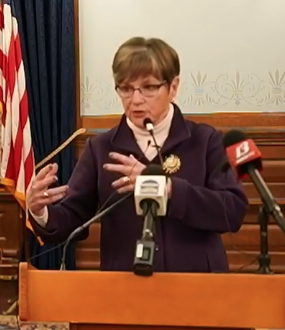
TOPEKA, Kan. (AP) — Driven by pleas from desperate local officials, Kansas legislators on Wednesday quickly created a state low-interest loan program to help cities cover spikes in costs associated with providing heat and electricity to their residents during last month’s intense cold snap.
Lawmakers sent Democratic Gov. Laura Kelly a bill that would allow the state to loan out $100 million of its idle funds immediately to cities that operate their own electric and natural gas utilities, to cover “extraordinary” energy costs last month. Cities would have up to 10 years to pay off the loans.
The bill was introduced Tuesday, had a hearing, cleared a House committee Wednesday morning and passed the House less than two hours later, 124-0. The Senate approved it, 37-1, in the afternoon, and Kelly promised to sign it immediately.
“This loan program is very important to our cities,” Kelly said during a Statehouse news conference. “It gives them the immediate relief they need to avoid dire financial decisions while we pursue other, long-term solutions.”

Subzero temperatures in mid-February led to a big spike in demand for natural gas, and other problems, such as freezing equipment, made gas hard to obtain, causing prices to jump. That left dozens of cities in Kansas with big energy bills that are coming due, and advocates of the bill said some could face bankruptcy without help.
The city of Denison, with about 190 residents 40 miles north of Topeka, has been billed about $241,000 for gas in February, when its bill last year was about $4,100, City Clerk Yvonne Hamer told the House committee in written testimony. She said that without help, the city will “go under” after 134 years.
“Now I am fearful that I will have to close my doors if the city has to pass on the outrageous gas prices which were incurred in February,” Samantha Correll, who purchased the Finer Than A Frog Hair Bar & Grill in Denison, said in a statement to the committee.
Lawmakers were concentrating first on helping cities operating their own utilities because they’ve already received one round of bills from the cold snap and have another round coming due. Kimberly Gencur Svaty, a lobbyist for municipal utilities, said many of those cities tapped out available funds to cover the first round.
Fifty-three cities provide natural gas to their residents for heat, and 118 operate their own electric utilities — some of which also use natural gas to generate power. Svaty said within a week, gas prices spiked at as much as 200 times what cities had been paying.
She said cities operating their own utilities face “an immediate financial crisis” because Great Depression-era laws aimed at stabilizing their finances greatly limit their ability to borrow money. Without help, she and other supporters said, those cities face imposing huge, short-term increases in customers’ bills, when loans would allow them to “smooth out” the extra costs over time.
Svaty also said that if cities can’t pay their gas bills, they risk being excluded from the market, which would leave some of them unable to supply their residents.
“This is something you can do right here right now that will literally make a difference in the lives of people in the next week to 10 days,” Svaty said.
In Argonia, a town of around 500 people about 50 miles southwest of Wichita, the city expects a bill of more than $500,000 from February when its typical monthly cost is $9,000, according to City Clerk Tara Pierce.
“This extreme cost could break us,” she said in testimony to the House committee.
In the House, Democratic Rep. Henry Helgerson, of Wichita, worried that the state would be on the hook if a city defaulted on a loan but voted for the bill.
The only no vote in either chamber came from freshman Republican Sen. Alicia Straub, of Ellinwood. She said allowing cities to take out low-interest loans is “acknowledging that somehow the consumer was at fault for this.”
“I don’t feel that the consumer is at fault, and I don’t feel that the consumer should have to pay this in any way,” she said.
But Chris Komarek, the city administrator in Straub’s central Kansas hometown of 2,100 residents, had urged lawmakers to pass the bill, saying in written testimony that it was “huge to the survival of communities across the state of Kansas.”
____





